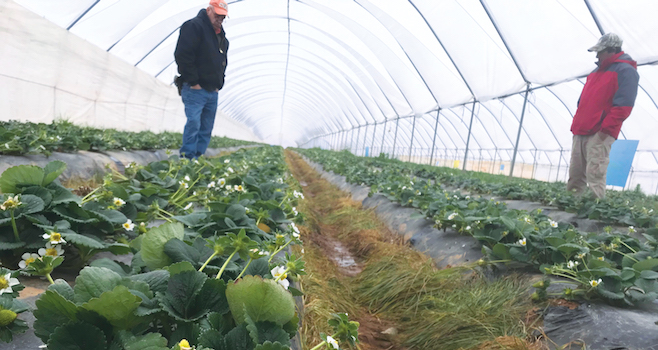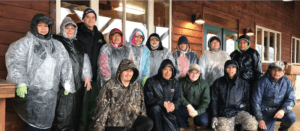

Sep 9, 2020Bob Hall is South Carolina’s grower of the year
Bob Hall aims to leave the red dirt of York County, South Carolina, better than he found it.
He rotates crops, working the soil, minimizing the amount of chemicals he uses. One of the first things he did upon re-establishing a farm, Bush-N-Vine, in the 1980s was to restore an old peach-packing shed from the 1930s. Three thriving farm market locations and a community-supported agriculture (CSA) program started by his son, Sam, continue a healthy business model of direct sales.
That dedication to improvement has earned the respect of other growers and professionals in the state. Bob Hall was recently named the Swisher Sweets Farmer of the Year for South Carolina. The program recognizes a grower of the year in 10 Southeastern states – the nominees each get a small cash award, some swag and free attendance to the Sunbelt Ag Expo in Moultrie, Georgia, scheduled for Oct. 20-22, where an overall winner is selected.
Upstate Clemson University Extension Agent Andy Rollins nominated Hall for the award, according to The South Carolina Grower blog.
“I am so proud of him and all his family for all they have done to make their farm and community great,” Rollins said, according to the blog.
Family history
Bob said his family has been farming in the region for about 150 years, with his great-grandfather growing cotton in the 1800s, he said. Other family members stayed interested in agriculture, with Bob’s grandfather growing peaches, and his uncle and great uncle also growing specialty crops.
Bob Hall started farming Bush-N-Vine’s current location in the 1970s while he attended Clemson to earn a degree in horticulture. He opened Bush-N-Vine when he graduated in 1980.
The old peach packing shed on the site is a fixture of the farm’s past as well as the present. When Hall found it, partitions had been built in for storing grain. Restored, he and friends held square dances on the raised wooden floor. He married Susan Templeton in 1982, raising five children at the farm. One of the five, Sam Hall, showed an interest in agriculture, returning to the farm.
He’s now an owner of the operation with his father. Together, they grow about 10 acres of strawberries, 4 acres of blackberries, 3 acres of blueberries and 15 acres of peaches. The farm also includes about 2 acres of greenhouses and 3 acres of high tunnels that help to extend growing seasons, such as growing day-neutral strawberries that ripen in the fall.
The old peach packing shed was the farm market for many years, but when Sam returned, they built a new farm market next door, three times as big, on a concrete pad. The old shed is still used as a break room by employees. In addition to the main farm market, Bush-N-Vine has farm markets in Rock Hill and in Lake Wiley, which allow for more sales in an area that’s between some of the main highways in the area.
“We’ve always been direct marketers,” he said. “We’re sort of in a metropolitan area; don’t have enough arable land to grow volumes.”


Constant improvement
The red soils of the region are a bit of a challenge – not all of the ground is even arable, or capable of being cultivated.
“Our soil here in this area is primarily a Cecil clay loam,” Hall said. “We think it can make great-tasting fruit, but it can be challenging.” Tillage is necessary to break up the clay clods.
“We’ve always been big believers in rotation,” he said. Strawberries are grown on a piece of land just about every fourth year, with the years between filled up with a legume like Southern peas or crowder peas, sweet corn and finally a small grain of some kind.
“Usually we’ll do a small grain right before we do strawberries again,” Hall said. “And so, we’ll cut the small grain off and plow all that organic matter right back into the soil.” All of the strawberries are grown in black plastic weed covers.
Challenges to growing strawberries include thrips, spider mites, botrytis and anthracnose. While the farm does have to use some fungicides and insecticides at times, Hall said they’ve begun using beneficial insects, and experimenting with using UV-C light to knock down fungal infections in the strawberries. Their goal is to be sustainable.
“We want to leave our soil and environment in better condition than when we inherited it,” Hall said. “That’s our goal, and so we keep honeybees on the farm. It’s constant challenge.”
CSAs in the COVID-19 era
Customer preferences have changed drastically over the last 40 years.
Starting in the 1980s, “we marketed to my parents, grandparents, generation(s) back in the 80s, who froze and canned,” he said. “Now, generations want fresh year-round.” The day-neutral strawberries are one way for the farm to meet that year-round challenge. Also, the seasons are set up so that there is a different fruit in season for most of spring, summer and fall. Bush-N-Vine has tried some different products, including some beef from steers that are finished on-site – customers can order a 30-pound box of beef.
The group has a CSA program. About 600 customers this summer paid for weekly deliveries of extra-small, small, medium or large shares of produce from the farm.
“My son started that in college in 2010, and that’s really taken off this year,” Hall said. “That’s one thing COVID’s really affected, is people are wanting more food delivered to them, and local to them.”
While hayrides and school tours have been canceled, the direct sales remain strong, he said. Customers are interested in the food rather than agricultural entertainment.
“I’ve always enjoyed providing something people needed,” Hall said. “And people need healthy food, fresh fruit and vegetables. We get great satisfaction in meeting that need. Particularly this year, people are wanting that again. … The Lord’s really blessed us – we’re thankful to do something we enjoy doing, growing fruit and vegetables for people.”
— Stephen Kloosterman, associate editor














